Eating Grass Makes you Stupid
There is only limited sense to the insult ‘birdbrain’. Have you fed ducks or swans on the river? Met geese? Tried to feed a robin? Some of these class as stupid birds and some do not. A robin or a tit will exhibit learning skills in the effort to gain food from you, especially in the winter. A magpie or jay, horrid birds, shows skills that must be learned in stealing eggs from nests. Crows are not stupid.
Geese, on the other hand, are unbelievably thick. Their heads are much bigger than that of a robin, possibly by a factor of five, which suggests two magnitudes more of brain space if they’re build to a common design. Yet a goose cannot find its way home, partly because it sees so badly. Geese run into doors, into fences and even into each other. Searching for an explanation for this I thought about the diet of the robin, the duck and the goose. My ducks ate anything you offered them, from Shreddies to snails, from bread to barnacles and even paté (yes, even that flavour). They ate their own eggshell from necessity and would eat snail shell and any sand so as to have shell material in their crop. A robin is a little more discriminatory but still eats a wide range of foods. A goose on the other hand, eats grass. And very little else. Rare is the goose that can be persuaded into eating much other than the common greenstuff, and of the greenery available, grass is the principal staple. An obvious conclusion perhaps?
Let’s consider the sheep and the goats.
Goats will eat absolutely anything, given any chance at all. What they like, apparently, is variety. There is nowhere they will not go for a new sample of food; the other side of every fence (can you imagine the goat equivalent to the grass is always greener…?), the garage roof, all over the kitchen garden and in the house if you leave a door open. Goats rapidly stop being friendly or pets until you tie them firmly to a stake. At which point you discover they are no more waterproof than yourself, so you cannot really leave them staked outside in a downpour. Thus the goat exhibits what passes for curiosity, inventiveness and anthropomorphically we accept this as showing intelligence. If you don’t like that statement, you’ll agree tat they don’t pass themselves off as stupid. You show a goat how to open a gate; it will demonstrate learning rather quickly.
Sheep on the other hand, generally eat grass. Enough already? Sheep in Cornwall and Wales have reputations for immorality, but that is more likely their partners at fault. Even if true, it would ony demonstrate stupidity. Sheep have significantly bigger heads than geese. Their brains are of a significant size. Goats have a similar shape and general build, yet goats are ‘clever’ and sheep are ‘thick’. So where is the difference? I say look at the diet. Let them eat grass, for they shall be the sheep of the field, to mix quotations.
When I kept sheep I experimented. No, not like that, you dirty-minded individual, I mean I tried feeding sheep different foods. One of our tups grew up with goats and had the habits of travel and feeding variety. Not for him the green stuff if variety was on offer. Cadboard? Lovely stuff. Asparagus? Now you’re talking. Thistles? Well, if that’s what you’re offering….. And yes, he loved lamb sandwiches. Chewing gum was unfair, but fruit pastilles seemed worth the work on his part. Sheep only have teeth in one half of the jaw and grind their food against some pretty hard gums, so mastic mastication is hilarious to watch, but probably unjust to repeat. Was this sheep stupid? I say not. He learned, where the grass-eaters did not, to identify food with people and could distinguish people, voices and calls almost to the same level as a dog. He knew which foods were worthwhile, and some weeding in the adjacent kitchen garden would cause him to run to join in, even when he was well past running age. All three of our ex-males and two of the females learned similar skills but the other sheep, including those we sent to market, refused to eat other than grass. So I never discovered if the meat changed its character, but I did test any theory that not-grass makes you not-stupid.
And so to the cow. Big head, big brain. Nice sense of curiosity, can be friendly and communicative, clearly learns where necessary. Oops, and a diet of only grass. If my thesis is right, then it is not grass that makes one stupid, it is having a variety of diet that makes one less stupid. So imagine what would happen if you fed a cow as more of an omnivore? Ok, let’s be practical, feed a cow on a greater variety of herbivorous material. It might be as clever as one of Pratchett’s camels. Come to think of it, how big a variety of foodstuffs do
they
eat? Could this explain his thesis that camels are the world’s great mathematicians?
Just how bright were the dinosaurs?
The Decision to leave Britain
The Decision to leave Britain
One fine week in late October of 2006, on five successive days I was caused to upbraid students for some loutish behaviour. Whether this was chewing gum in school, or pushing smaller people around or the umpteenth occasion of telling the same child to tuck its shirt in, find a tie, fasten said tie or even make space for others in a corridor, does not matter. The distinction that this week provided was that on each of five successive teaching days the last comment from the pupil was, basically,”what’s your problem?”. Once, I might take as cheek: five of them, from unrelated incidents and kids in different years, I take with credibility and begin to wonder if I do have a problem.
So in the middle of November I write to the new Head, indicating my unhappiness with teaching in Plymouth. Realistically, with teaching in Britain; there is no getting away from the fact that independent school is a privileged society. I give him notice of intent to quit; indirect, I know, but an accurate description, hoping that perhaps he might indicate changes ahead that would keep me on the staff.
On the last day of the Christmas term we all receive letters explaining that there need to be some redundancies in the teaching staff and asking those willing to consider this to please put themselves forwards. My response is immediate. I have seen forced redundancy in effect and the result is not uncommonly that the recipient is given such a blow to their confidence they do not work again. A vow taken at Shiplake demands that I offer myself – and it may well solve my issues with teaching.
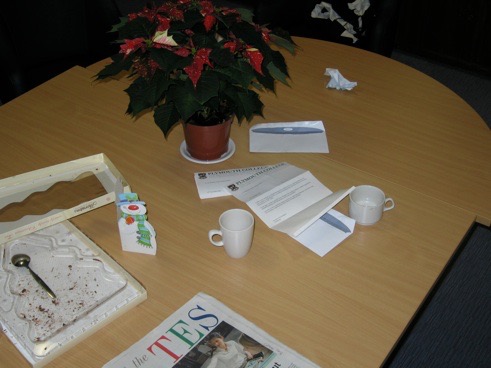
I photographed the letter, going back home for the camera, when I found a copy left in the middle of the empty Common Room late the evening of the day it was received. On the table were some unfinished biscuits and a potted plant that was someone’s present, as if the letter had prompted abandonment of the room. I moved nothing to take the shot .
I spend late January and the first half of February looking for jobs. I look for teaching jobs abroad only because it is the right time of year for the adverts. I look at English-speaking jobs in any part of the world. Effectively I shall be retiring – my financial advisor keeps on saying I could do that – so any income will avoid expense and I am keen to ascertain the extent of my wanderlust and my capacity to live outside the UK.
Eight to twelve weeks from the first notice we (the Head & I) have agreed that the school can lose a mathematician permanently (I’ll have them in court otherwise), we have agreed on a sum less than I want and more than the school wants and I find myself very comfortable with the decision. My colleagues who only thought and dithered now realise that I really am going. The news slowly percolates through the school and by the last six weeks everyone knows I am going, and going happily.
I am emailed by a company in China, and a telephone interview ensues, resulting in an offer. The second interview raises the stakes (the position rose to boss status) and confirms my commitment. At Easter, instead of going tripping around Europe, I think it wise to go have a look at what I am letting myself in for, and this proves a wise decision. I pay the flight fare and the company pays all the hotel bills, makes me feel very welcome and spends large amounts of time showing me around the school, informing me about their ethos and objectives. I spend most of a week at the school, which is still in term, and go round listening to people in a way reminiscent of my days as a management consultant. Several issues come to light and some result in suggestions that are grasped with an embarrassing enthusiasm. One such is the chronic shortage of textbooks.
So, having decided to change countries, there are then choices to make over property. Another essay deals with the detail of this.
Removals
The paucity of textbooks in China, followed by an offer to clear out the ‘old’ ones from Plymouth, puts me in a situation where I may as well use the move of books to excuse moving lock, stock and barrel to China. I contact six removal companies over the internet. Only one replies, a Crown International. I know that what counts as a big firm in Britain is small fry internationally and it appears that Crown is a fairly large player.
A representative comes to visit on a day with inoculations booked. The three-hour gap should be enough, but he is caught by Glastonbury traffic and arrives late. Late enough that I need to go have the jabs before we have really finished. I offer him the opportunity to stay and complete his schedule more slowly – I will only be twenty minutes – but he declines and I chase him away feeling we have probably said enough but I wanted time to think of new things to make clear. I was quite certain I had explained my objective, to have my stuff in China shortly after arriving there on 1st August, that therefore time was of the essence. He leaves me a pile of paper that tells me little I didn’t already know, but it is good confirmation that they know their business.
I have to chase Crown repeatedly to set a date for removing my gear and we reach a point where they suddenly grasp what I have been saying and the stuff disappears on June 18th, a week after them telling me. The gap between the first visit and the removal is of the order of six weeks. I am thinking the boat will take six weeks and so 18/6/7 for gear to leave Plymouth is about as late as it could be. I end up asking whether they think the stuff is leaving Plymouth on August 1st and it may be that the message was garbled. If so, that was entirely internal. My emails were very clear and unambiguous.
So I have six weeks left in Britain with the gear that has not “gone on the boat”. This takes planning and I don’t have it entirely right. I then discover the tiny amount of permitted luggage is 22kg and spend the last days of July sending the surplus by air freight for £200, which works out as ‘only’ twice the sea freight rate. This arrives in four days and I collect it from the company office on arrival in Xi’an. The cost of the sea freight works out that, despite original message to the contrary, the cheapest way will be for me to book a whole container (if I had known this I could have arranged a sharing with a fellow new colleague). As such I may as well do my best to fill it, so everything but the car becomes liable for packing. I now know I should have been more literal with that interpretation and even packed bedding and furniture. Once committed to a container, the volume has little effect on the price.
We are looking at £4000. This is payable up front (not clear at the outset and a point of contention, but they now have my stuff and I feel conned). The insurance rate is 4% of the value. While that comes to another £1000, my thinking is that 4% suggests there are many claims and grounds for such claims, so I want to insure my goods. I am also thinking that if I had known this earlier, I might not be doing this at all. Allow another £1000 to cover import duty, definitely not understood, and we have a £6000 hole in the accounts.
August goes by, and I am now resident in China. It becomes clearer that the Import permit is an obstacle and I have written about that separately. However, communication between my office (Petal) and the Crown Beijing office (Cynthia) is pretty good and we fulfil our promises in making the paper appear rapidly. It then transpires that my gear is still in Britain. Cynthia asks me to fire shots across bows for supply of official paper, sent and responded with alacrity, but I cannot understand how it is that the goods have not been in transit. I was very clear about the required arrival. I was clear in understanding that the transit time was the time in which the Import Licence must be produced and clear that this length of time was acceptable and manageable. The only helpful and effective member of staff at Crown in Britain (besides the two removal men themselves) goes away, perhaps for the school holidays. At the end of September I am in a situation where I have now been three months with what I guessed would be appropriate for a new country for at worst two weeks. Half my shirts are still too warm for the weather here and I have three sets of clothes. I have no textbooks with which to carry out my job, too little computing power and no furniture.
Crown has failed to deliver, failed to communicate, taken no regard for promises made and largely kept me uninformed. The poor girl at the Beijing end is left trying to patch things up and let down at every turn by the UK end. This is not a company with whom one wants to do business. Yet, among the ex-patriot community, it is agreed that Crown is one of the biggest players.
I am deeply unimpressed.
I have since discovered that just a little more communication within our new staff across China would have saved several of us half my cost and we could have co-operated to reduce costs to a point where the company would pay for removal, simply by providing a single container among many of us. As it is, I am significantly out of pocket and the value of the books that were the point of the removal is fast disappearing as the term progresses. Time was of the essence of the contract. The information was not wrong but the promises were and are unfulfilled. I cannot see how I could have been clearer without the assistance of clairvoyance, and Clair is not known to me.
DJS Typed around 200711
Related stories: Wine to Water Moving Four letter Words.
Do not use Crown Relocations. or don’t use them without learning from my experience and applying that knowledge to extract promises you can then act upon.
Photo added 20100824, at last found.
The Sock Monster
One learns, slowly, to read the little label affixed inside one’s clothes – the one that indicates what temperature to use in the washing machine and the setting to be used for the iron. Eventually one learns that taking stuff to the dry-cleaners is a pain too far and so remembers to look at the said label when looking at a purchase. With practice, one (still, eventually) learns that some materials would be best ironed on the inside, that steam can be used at low temperatures and one may even rediscover old skills such as ironing through paper for better effects. Why we don’t teach our children these skills, I fail to understand. I said some of this recently at a dinner with people from Oz and the US, (or is that os and uz?) who said, translating, I am an idiot for knowing how to use an iron, for possessing one and why not use drip dry - and how very British. Which made me look at their clothes closely; I am as unimpressed as their clothes are. If you feel I have misrepresented your nation, do write with refutation, please; I will wield cudgels on your behalf.
In the same way that we learn to use the iron more effectively, so we also learn to use the washing machine. In the modern climate of saving energy we tend to wash clothes at cold settings, often colder than is effective. Washing machines offer a huge range of washing programmes, few of which are appropriate for the next wash and implying, by that very variety, impossibly huge families, co-operative washing schedules or very in-frequent washing schedules. Most of us, I think, end up using a limited range of set-tings. I suspect that many of us simply find something that works and settle for ‘wash’ and ‘not wash’. Talking to student-age people, it seems that bothering to set a temp-erature (intelligently) doesn’t happen. Deciding whether the majority of the wash is of the same material or the same colour enough to modify the settings on the machine is a rare event, probably based on experience. Experience, that is, of the sort that spoiled some clothes – your favourite red socks remain red but change the colour of your underwear; a dark blue towel leaves patches of something vaguely blue on your cotton shirt.
“Wash dark colours separately”, it often says in the essential reading: separately from what, pray? Darks separate from lights? whites? Do you do a socialist wash? [all reds together]. Do you wash blacks separately from reds?
So to socks.
Have you noticed that, however many pairs of socks - and, therefore, an even number - you put into the wash, an odd number comes out? Do you wash your socks separately or with the other similar colours? Does it make any difference to the essential question here:
Why do fewer (not less) socks come ‘back’ from the wash then went in?
Answer: the sock monster.
“The what?” you think. Empirical evidence—meaning the experiment offers an explan-ation that makes no theoretical sense as yet—says socks go into the wash and some of them disappear. So where do they go to? You’ve been back to look in Confusion (a good name for your washing machine if it’s not already labelled as Philip’s)¹ ; the sock is not there. It has vanished. If things can vanish, then there are quite possibly other things we cannot see, not merely the tree in the quad². In which case, we can surmise some other agency has possession of your sadly missed hosiery. This agent is the sock monster.
I have a whole drawer of once-white running socks, about 50, where 70% are now odd socks – and the total number is, of course, odd. I have running socks where the sort of weird thinking that reduces people to obsessive-compulsive disorders applies such as ‘my team wins when I wear these": “I wash these socks by hand so they don’t lose their lucky charm, their luck or their charm”. Well, I don’t, but I would if I had any.
No, I have not seen a sock monster any more than you have. But I can confirm that most washing machines soon acquire one. Obviously, sock monsters come in ones, not pairs. I suppose they may group together in odd numbers—odd primes would seem appropriate—and I am waiting for any regular user of a washeteria to tell me about missing clothing – but they certainly don’t collect in pairs.
I am reasonably convinced that the sock monster consumes socks, since the missing ones rarely reappear. It may be that juvenile SMs work up to actual consumption, for I have noticed that newer washing machines do surrender the missing hose, making you think you merely misplaced it.
My brother’s family all wear black socks and do so a lot of the time. Not exclusively that colour, but they do have a lot of socks that are black. On at least one side³. The family has a periodic sock wash of around 50 pairs (that’s obviously the number, not the period). There is therefore a post-wash family game of pairing the socks (back together). This requires serious sock-recognition skills. Observing this domestic ritual with some fascination, I asked about their sock monster experience. This caused complete confusion and a run of mismatched black socks (who would know?). This family has a monster-free sock wash: or perhaps only claims so and has not noticed, but they’re a pretty bright, observant lot. I wonder whether perhaps a sock monster can be diverted by a surfeit of supply.
Readers should experiment. In private. This may be safe to do at home⁴.
DJS 20100828
Written as a birthday gesture to Sam Scoins of the Auckland branch of the family, who will be able to read it at about the same time as the story makes sense.
1 Philips, Philip’s: insert-able apostrophes are available from any Lynne Truss website.
2 There was a young man who said, "God Dear Sir: Your astonishment’s odd,
Must find it exceedingly odd for I’m always about in the Quad.
To think that this tree and that's why this tree
Should continue to be will continue to be
When there’s no one about in the Quad. Since observed by, Yours faithfully,God
Ronald Knox, writing about Hume’s theory of causality Bertrand Russell (perhaps)
3 A mathematician, an engineer and a politician were sharing a train carriage as it travelled north in Britain. As they crossed the border into Scotland, the politician looked out of the window and said, “Oh, look, all sheep in Scotland are black”. The engineer commented, “That’s a little sweeping, surely; the sheep in that field are black”. After a short pause in which the other two watched the politician regain control of his emotions at being corrected, the mathematician said, ”Actually, we can’t even say that much with any great accuracy. All the sheep we could see in that field were all black – on at least one side.”
4 Our newest washing machine is called Dobby or Dhobi. being both a dedicated house-elf and a washing wallah.
the New Flat
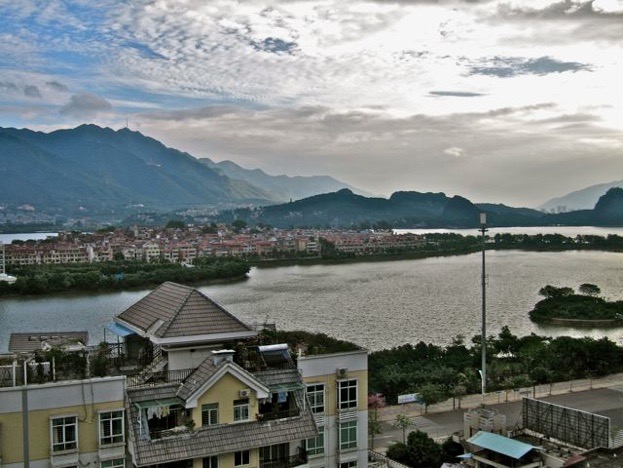
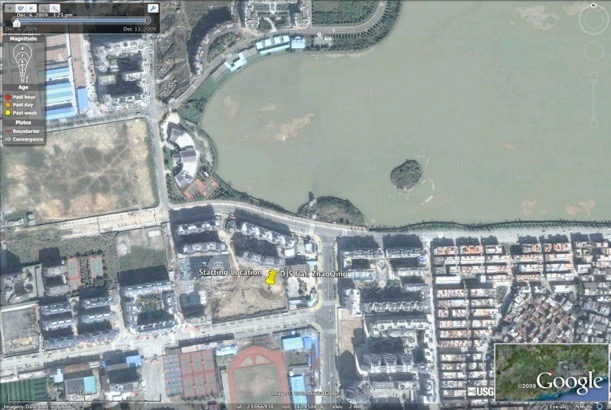
So many people have asked for pics of the new place that I am adding it in here.
ZhoaQing, or ZQ, is’a third tier city’: it is smaller than the previous places I have lived here, and, depending how one defines the place, is more like one million that the eight of Xi’an and Nanjing. Guangzhou, Canton on old atlases, is three hours away by bus and a bit less by car, depending on the traffic. The province is Guangdong and HongKong is another two hours beyond GuangZhou, GZ. Airports are at GZ [80km], HK, [170km] , ShenZhen, Zhuhai or Macao [each at 150km]. The Pearl River, the Zhu Jiang, meanders east-west across the province and GuangXi next door (Xi = west, Dong = east]

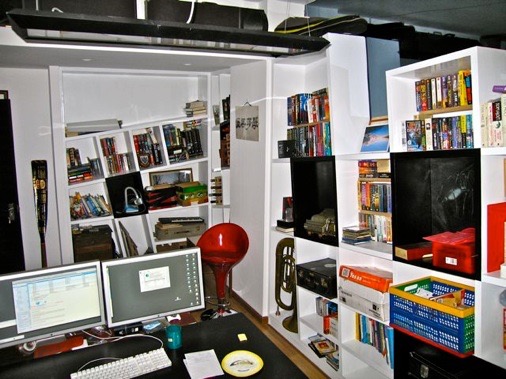
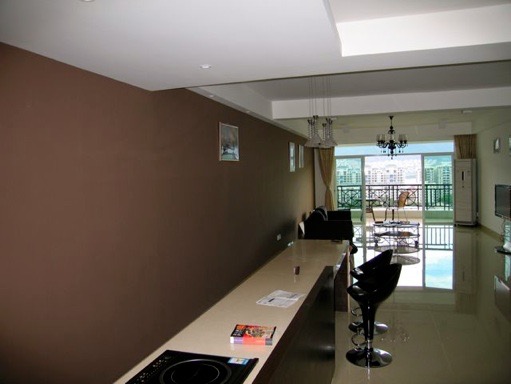
The Office / Library really is built askew and works a treat. The bedroom area is to the right of the living area and includes a dressing room and a bathroom. The kitchen area is to the right of the ‘bar’ and a second ‘restroom’, as they are called here, is just off the entrance.
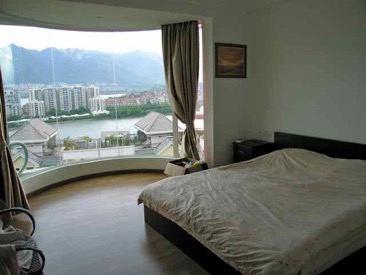
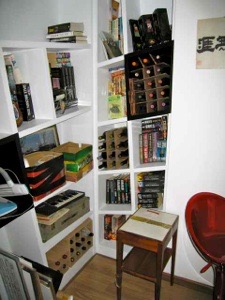
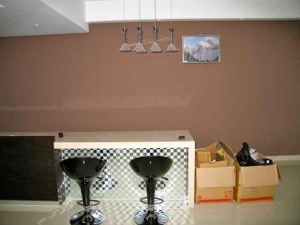
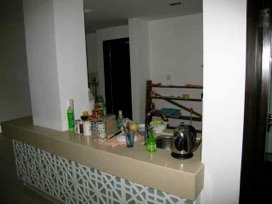
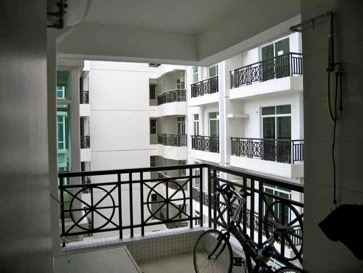
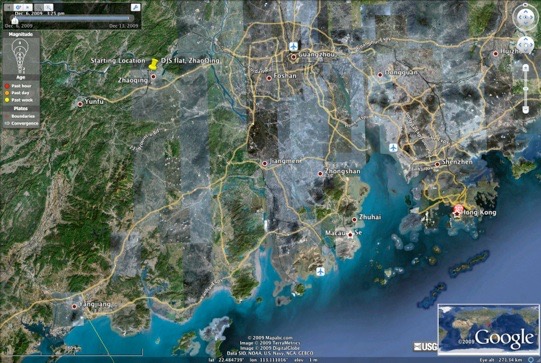
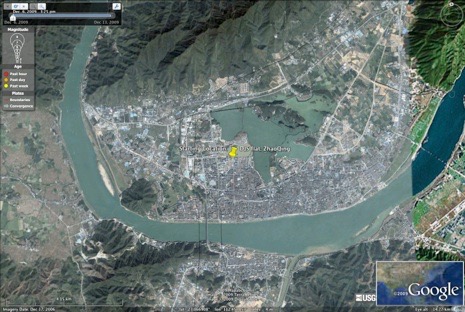
Most of the city itself lies inside the visible loop of the Zhu Jiang and south of the Seven Star Lake. The company’s Head Office is on the river frontage off to the right of the shortest line of road connecting lake shore with river bank. The hills to the north are the size of the Lake District, and run up to the 1000m mark. Access to the hills is limited by local knowledge and there are no available maps unless you are in the military. It is quite likely that making one would be an offence, so I will wait until the G3 signal arrives here and the GPS on the iPhone will do any mapmaking for me.
The apartment is on the southern edge of the SW-most lake, facing north across lake and to the hills, to the centre right of the construction site (now estate) shown on the right.
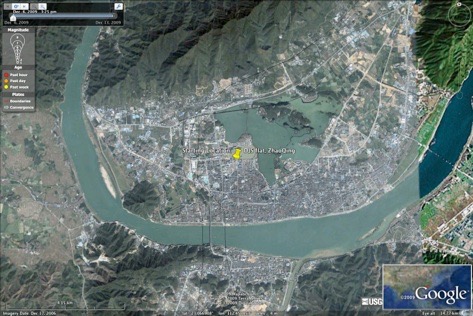
The flat is good but far from perfect. The bar feature fails in design in several respects; several features of design fail in execution. The office is a nice place to be, but the desk / table does not fit, for example. Having sockets in the floor is great until the cables are in the way.
Local facilities are fine; a wide selection of eating houses lie within ten minutes walk.
The location is good within the city - we run round the two west-most lakes most days and run on the NE one of the two adjacent tracks (that made you look, didn’t it?).
The location is not so good when trying to travel elsewhere in China, though the one daily train to GZ and HK is a useful service.
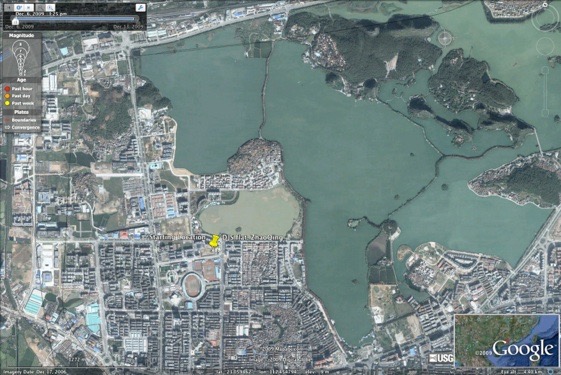
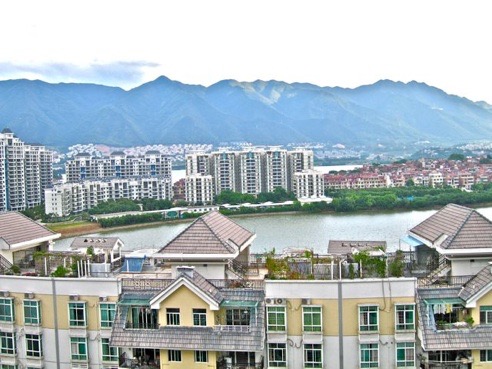
The estate comprises six blocks, A to F, where the northern buildings are six or ten stories and the southern ones are 16. The flat is on the 13th, so the view from the northern balcony looks over the eight storey building between it and the lake shown built in the Google Maps picture.
and the point is ..?
A relatively daft essay, where the title occurred and I attempted to write to fit the title...
A point has no size but simply marks position, says the definition in my head and as used in lessons. Yet if a point is something sharp, such as the blade on Death’s scythe is sharp, it should be better described as an asymptotic limit, in which case the points defining the edge would be themselves undefined.
I wonder how sharpness is measured: one imagines that a blade or point has a measurable dimension. I don’t mean image sharpness; Google tells me that the measure is the radius of the end; the test machine I found has only two dozen units extant [www.catra.org] and the test standard is ISO 8442-5:2005. Generally sharpness is governed by the angle of the two opposing faces – and then the radius of curvature of the edge matters (and is worth measuring). Needles are measured in gauge (G), an inverted unit , meaning the number gets bigger as the size diminishes. The tube part of a lancet (regular medical) point has the edges at 15º and there is an ‘A’ grade at 12º . A ‘French’ equals 0.01312 inches diameter and is used mostly with catheters. Fine needles are around 31G, 1/100th of an inch. The finest I have found is a 33G at 0.0080 inches, 0.203mm outside diameter and 0.0035inches [0.089mm] inside. Sadly, this is an inch-based unit.
The point, as in “Why are we here?” is an unknown. Apparently many feel the point is to leave your mark, but whether that is on the planet, in history or by some physical damage is not made clear. For some, it is the extension of ones genes: however, given that those with genes worth spreading have small families and are far outweighed by the masses whose genes are sub-median (about half, then) and who have unfettered families, the mathematical law that says things will tend to the norm applies. In general, two high IQ parents produce lesser offspring and two low IQ parents produce higher-rated children – tending to the mean (and IQ is a poor measure, but the one available).
“Where’s the point?” could be the question of a depressive, and it deserves an answer: If the question refers to the point in life then biologists say that the point is to further the gene pool. That covers a brief period in the life of a human and, if the supposition were the whole truth, renders most of each life an utter waste – therefore the issue (both question and progeny) must be rejected as not being the whole. Equally there is little point in a non-productive life and that then begs the question what constitutes one of those. The British government, especially in the Blair years, was desperate to raise the education levels of everyone, not least to lower or disguise the unemployment figures, but also to encourage people to move between careers by cross-training and by having education at all ages. In China it is taken as gospel that one of the primary duties is to educate oneself to the highest possible level; the US is not far different. Education achieves what, though? How do we use it? What education proves useful in advancing the individual, the nation or the race? Do we all study like mad so as to increase the chance that rare individuals develop something grandly new? [Just how many software programmers does the world need? How many genuine mathematicians?] What is it that we are chasing?
Some people chase fame, fortune and happiness, a trio I reckon not to overlap by much. Having tried them all, I recommend the third, though a modicum of the other two can assist. Self-knowledge seems to be a powerful tool in chasing any of these, and those that achieve all three are often pursuing some excellence that appeals internally first, finding a market for their preference that brings the other attributes. Of course, one remains unaware just how many people strive to no similar effect. It would be interesting to measure what constitutes success: I read a book today that said an interesting life is not necessarily a satisfying one; I would claim though that it makes more opportunity for satisfaction than an uninteresting life. A colleague last year proposed the dictum that one should live life to the full, flat out, squeezing as much as possible into every day – for you know not which is your last. As he put it at the time, if you’re not going to do things, why be here? So for him at least, the point of life was to live it.
An economist might argue similarly. The greatest (really? easiest?) benefit each consumer can give is the circulation of wealth; therefore one may argue that we are each beholden to spend and earn as much as we can – to be good little consumers.
I am sure there is more to write, but this is all I did, late one evening, circa 30 Oct 2008
DJS 20081030
Wk 2: heat
A trip to the supermarket involves a walk of about a mile in total; on the 11th August the temperature was around 30º and the humidity – according to my desktop widget – was at 32%. The result of that short walk, coupled with a similar time in the shop, which is cooled somewhat, is that my clothes need to go in the wash. If this is 30% humidity, I dread the very idea of the 90% I mistook it for.
Today, 20th August, is advertised by accuweather as being 18ºC, “real feel” 26º, humidity 59%, visibility 4km. Visibility at ground level is more like a single kilometre, but I’ll agree with the rest. I have just walked to school and back; all of ten minutes and ten minutes wandering around trying to find a room open and or a colleague I can talk to. Back in the cool of my apartment, I realise that school doesn’t have any cooling and I cannot work under such humid conditions. My trousers are damp, my shirt sticks where it touches and is showing unsightly damp patches already. I have ironed it dry, as I have too few shirts to choose another for today. I had packed a tee-shirt to replace the nice shirt with when it became unusable but I cannot see a way of being cool (or dry, maybe) enough to achieve anything approaching useful work in such conditions. And some lessons were in progress, in Chinese. I can see why one would want to have lessons very early, but already, at 0815, the conditions were way beyond anything acceptable in Britain. This is going to be a real problem.
Never having experienced humidity before, I am confused by the effect on the body. Clearly the cooling mechanisms fail because the sweat is not evaporating as it would in drier climes. Why, though, is the perception that the ambient temperature is so high? Is that an experiential thing – does a local perceive more accurately somehow what is occurring and recognise the different effects of temperature and humidity?
I have been out running daily for the last fortnight, whatever the weather. One expects to sweat. My singlet changes colour entirely, it can be wrung on return (disgusting) – even my socks can be wrung a little. The difficulty of heat loss is less debilitating than I expected and – it may be that I am acclimatising – I am running tolerably well at 30% humidity now. 60%, though, is a different matter.
Not only can I not cope, neither can my clothes.
There was a lengthy period while living in Cornwall when I was suffering from sunshine. All I had to do was walk across the yard to the car and back (without a hat) and my head was baked. Basically, the blood on the top of the head became too hot. The blood supply to the brain couldn’t take the heat away, and I spent subsequent parts of every day when I forgot a hat hiding from the sun, lying down waiting to recover, basically being utterly useless. Yet going for a run was not a problem, which was what led me to the conclusion about blood supply. If I got the body working soon enough, the heat was dealt with.
Some time after that, not long before leaving Cornwall, the problem went away and I could happily spend large parts of the day outside being active or inactive without consequence. Total inactivity remained a problem – sunbathing is not my scene anyway – and lazing around without a hat returned the previous state.
China has shown me some sunny days; I have seen blue sky and I have seen over 4km into the distance. I do not believe the air has been clear enough to see the (Pyrennees size) mountains a mere 20 miles away. I am beginning to wonder what the norm is for air quality but I can already observe that high humidity and poor visibility go together. Apparently Beijing is much worse. Time will tell.
DJS 200708
related stories: Feeling Cold
Wine into Water
Over the last three years I have collected wine from various sources. It became the habit to supply wine to the Sunday staff meeting in the Boarding house and between us, Martin and myself kept this up for most of the weeks in term for that time. I may have supplied two thirds of all of that, which might amount to six cases. Thus the habit was created to buy a bottle when the opportunity presented itself, and a case if a really good offer or opportunity came by. Examples would be while in Roscoff waiting for the ferry back to Plymouth, or in a winery in Francshoek in the central Stellenbosch, or just by chance in a supermarket. Add to that joining a wine club, which provided a case of varied wines every quarter for under £70 and you have a reasonable number of bottles in short order. I had the habit of transferring bottles into single servings of 250ml (having bought some of the small bottles at Tesco) so that I could enjoy just enough of an evening, and so also began a drinking habit. Not a dangerous one, but just French enough to claim that the arteries couldn’t be hardening because red wine in moderation is ‘good for you’.
So it was that on departing Plymouth, the dungeon collection still amounted to six cases. I shared most of one between Martin & Mary and Jess & Pete and, having decided to send a mountain of books to China, reasoned that I might as well take the wine with me. That which I had drunk in China in the April before was palatable vin de pays and I reasoned that having a supply of other (not so much better as different) wine might help friendships begin.
The information available said quite clearly that wine is taxed on entry to the country, but implied that the tax was different depending on the port of entry, as the tax was applied by provincial authorities, not national ones. No mention anywhere of how much the tax might be, but basing my thinking on British values then even a 100% tax would be just about acceptable. The tax varies also with the alcoholic content, particularly from 12% to 15%. I think that is what defines a wine, as I discovered that all mine fell in this bracket. I wrote an inventory for the port and customs authorities, detailing the source country, the % alcohol and the value, all as required in the paperwork.
The wine went off to the boat with everything else on 18th June. In rapid succession I lost my residence (and hence any toehold in Britain including an address) and my gorgeous car. I arrived in China on the 1st August; with significant help from Xiaolan (which translates wonderfully to the Geordie familiar ‘petal’) I acquired a residence permit, a foreign expert certificate, a work permit, an apartment, and mountain of bills to be paid with no actual income, only the promise of it. The air ticket out was purchased by my employer, but nothing else has as yet been paid although at the time of writing I have been in the country for two months.
On about the last week of August my petal colleague took me next door in Xi’an to the Customs Office. Declaration House, it says on the outside. A large, spacious building with a grand frontage, this lies on the corner of one of the larger crossroads in the Gaoxin (‘high tech’, literally) area of the city. T
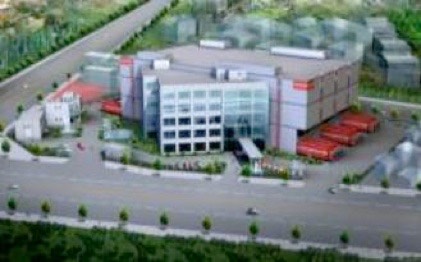
he space in front is used for those calming physical exercises considered stereotypical of the country, generally performed by the older generation and in this case most get changed into silk-style pyjama suits for their morning ritual. The staff that work inside may include the exercisers, but only the younger end of the age range are visible as officers in the foyer. Entry to the building is easy and it is very similar to a bank in that there is a long counter and supplicants are seated or stood on one side with the customs officers generally sat sideways on the other side. Computer screens are below desk height, there are pillars galore in the hall and the impression is quite grand. Inevitably in China, there is no queuing worth the name and service is acquired more by intrusion than a little politeness. Thus when you think you are being served there will be a succession of interruptions by people who march in and demand an answer, generally in a voice that in Europe would collect general attention including from the security guard and probable rejection from the building.
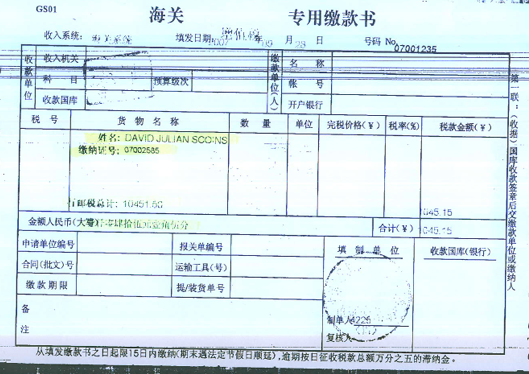
My vital assistant escorts me to the rather pretty lady who is dealing with my case(s). We work through the inventory of 115 boxes that went onto the boat understood to now be in Tienjian, a port on the coast not too far from Beijing. She has been working her way through the list (as translated by Petal) and has extracted those items that cause concern. The list goes down dramatically when she decides the books are not to be taxed. We (meaning she and Petal) have had several conversations on the phone and this should be the significant one where the tax is declared. Declaration House, verily. My several boxes of computers whole and in part are misidentified as screens, or vice versa, and one is declared to be a(n) hi-fi. These are steadily corrected and transcription errors are removed so that the list is at least understood. That a computer might have two screens is very suspicious. That I do not have a hi-fi is also suspicious. It was a good thing that we spotted that, since the tax on a computer is 20% and on a hi-fi, 75%. I notice that the units of size and currency have been lost on the form and comment in clear language that this is so. The wine list is presented as a problem until I point out that 75cl is not an unusual volume but a standard bottle, 75cl = 750ml, that the cases are numbered and the list is declared by case – it is just that they can’t read numbers any more than I can Chinese. No knowledge of the units, no knowledge of wine (except it must be taxed; it might as well be jewellery for all that anyone cares).
Facts: there are about fifteen RMB (or ¥, yuan) to the £ pound, so ten to the € Euro. The maximum tax on anything in Britain is still less than 100% and a 90% tax is considered extreme and usurious. The tax in China on wine is levied on alcohol content by volume. I have drunk wine in China at 100 to 200 RMB per bottle and noticed one of the bottles also in my collection in the supermarket at about 250 RMB (and since seen at 180 elsewhere). I am well aware that wine in a restaurant will be between 100 and 200 RMB.
What, then, am I to think when the tax is declared to be 500 RMB? You misunderstand; that is per bottle. Each and every bottle is to be charged at 500RMB. That makes 30 thousand RMB or about £2000. My little assistant can’t cope with this number – it is not so different from what she is paid in a year. The pretty customs officer shows me the book as I claim there must be a decimal point lost. We are slowly convinced that this is not so, but there is no answer to the observation that I buy the same wine in the same city for a quarter of the tax – so someone is being corrupt. That would be one of those oh-so-common times here where there is no answer without a loss of face, so there can be no answer. Or else yet another meaningless “yes”. That I propose to refuse to pay the tax is met with a meaningful look (not interpreted) but no comment. I explain that her colleagues in Tienjian or Beijing or wherever had better drink it or bin it, because I am not paying £2000 to bring the wine across the border. That this is turning a 100¥ bottle into a 600¥ bottle. One or two of them might be worth 200¥.
My little helper really can’t cope with these numbers. The tax on all the computers comes to 2000¥, under £140, partly because of the units being lost, so maybe it should have been £2000. I have that sum of 2000¥ in my pocket, as it happens. Not that anyone is asking me to actually say or spend anything, it turns out, just to hear the declaration. Now I understand the name on the front of the building. I am not arguing with the numbers; there is no point. I have seen the official book (which means what? I can’t read the script that goes with the numbers).
So the sailors can tip the wine into the sea. The customs officials can turn wine into water. This is Biblical; it is Epic. Whatever the opposite of a miracle is, this is it.
Here endeth the lesson.
Or does it? It turned out that the ship was not yet docked, but barely into the Indian Ocean, leading me to wonder what size it actually is: a coracle? Now, in the last week of September, My passport’s presence has been demanded in Beijing by the removal company. This is against all the Foreign Office advice I thought I had read, which I understand to say to treat your passport the same way as your credit card and not let it out of your sight. Apparently my choice is to send the card or go in person as its chaperone. That doesn’t mean I am right, it only indicates what I think is so. The situation – making the import of anything so very complicated - illustrates the protectionism that the US complains about, not that the Americans are so very different with imports; I am looking forward to an informed discussion with Business Studies students on the topic. It is easy to bring money in and goods out of China; the two opposite moves are made distinctly difficult.
Colleagues are surprised that I am not interested in the state or position of the boat. Hoagy would agree with me: the information is of no consequence. When the stuff arrives, I will deal with it. Since no information is worth the paper it has not been written on, there is no point doing any planning. It will arrive when it does.
Is the story over? I do not know: when the tax is paid and when the goods arrive, with or without the wine, I may believe the saga has come to an end. I am not comfortable with the prospect of a move in the other direction after this experience.
Horrid, but True:
In order to persuade a Chinese person to do something, you must blackmail them. Nothing too strong, but a fairly typical example is that I refused to pay (not true, I only threatened; I want the gear and they know it) until I received an explanation. Fond hope: I was sent two attachments, both of which are shown above. The end result, demonstrating that if Crown UK sent anything to Beijing, no other response occurred, since I have heard nothing from them, is the following collection of mail messages between myself and the lady in Beijing who is working on my case. She would rightly say I was on her case, I suppose. I am not sure what this reveals: I am a bad-tempered old git (well known); communication is prone to failure (what a lot of this is about); service industries aren’t that (discuss; try to use less that a ream of paper); take your pick.
I have taken some words out of the messages, but added none. I have compressed the formatting quite a bit. Cynthia is one end, in Beijing, Petal is in the office and I am clearly in the way.
09/25/2007 10:27 AM Dear Cynthia:
I have just seen your last mail to.... Xi'an. i understand she has passed you the details of the customs officer we have been dealing with.
Please explain in detail how the duty has been reduced from more than 30,000 RMB to around 15,000. I am very very suspicious of the events, having been shown the mechanism by which the tax was worked out here at the Customs House.
I know none of the situation is of your doing and I recognise that you personally have been working hard on my behalf. The goods belonging to me have now been out of my possession for thirteen weeks when the original agreement was that the whole process would be over in six weeks, delivered to me at the beginning of August. This is not good.
My situation was, I thought, well explained: I will not pay 30,000RMB for wine when the tax should have been explained to me as being over 100% of value before it left British shores. I will not pay for it to be sent back to the UK, as the situation is most definitely not my error. I pointed out the problem before agreeing to send it, I pointed to the differences in ports of entry and I was over-ruled by people who are supposed to know better. Knowing what I know now I cannot commend any transfer at all of goods into China.
However, given what the tax should have been for the computers, 15000RMB for absolutely everything is reasonable. I have that much, but not ¥160000 without some more advance notice, as I will need to transfer more from Britain. I will make ¥15000 available this week. This could be taken next door for payment more easily than a bank transfer.
I will not proceed any further without an explanation. I cannot honestly make a payment without understanding how the number has been reduced so dramatically.
Regards, [Petal]
09/28/2007 07:17 PM Cynthia:
I congratulate you on reducing the bill for import duty still further. However, I require an explanation how this happened, as I explained in my last email.
I have had no explanation from you. I have had no response from you using email.
I also indicated in that mail that you might tell me how the payment would be made. You have had the opportunity to make my end of the transaction quick but you did not take it. The result is that i probably cannot move money as requested by you (i.e. tomorrow) simply because you did not plan ahead and tell me by which method the payment would best be made. Your proposed method looks underhand and improper. You have not sent me an email for many weeks, since the 5th July.
I have taken actions based on the existence of a National Holiday and now expect delivery to take place some distant weekend.
You do not understand why I might want an explanation. You really must give me an explanation in detail before I will pay money by methods which in Britain would be declared fraudulent. For the third time in this mail, I NEED an explanation, I need detail how the duty changes from 30000 to 15000 to 10451.50.
Regards,
09/29/2007 10:40 AM [and twice more in 40 minutes] Dear Mr Scoins, Good day.
This is the first email that I receive from you. I never received email from you directly. From the beginning, I communicate with Ms .[[Petal]].. and I only mentioned about the import duty in my last email to [Petal] dated 24 Sept that the import duty will be around RMB15000 including the wine/alcohol, which is estimated by myself. On the one hand I want to give you a rough idea about the duty amount, on the other hand I want you to prepare enough money in case the customs requires payment urgently. I hope that you could understand it. I have attached the tax return for your reference.
We must get the container released from the customs at seaport and collect the container from seaport yard today. Many trucks queue up for container collection. I talked with Xiaolan this morning and she told me that you are close China Construction Bank. Please urgently arrange the payment to the following address.
Inbound Manager
The Crown Worldwide Group has over 200 offices in 50 countries. The Crown Relocations division specializes in employee relocation services for multinational corporations. The company is also a leader in the management and storage of business records and provides other specialized transportation, logistics, and warehousing services for expanding international businesses. The Group provides services to over 2,000 major multinational corporations around the globe. For further information check out our website.
09/29/2007 11:30 AM Dear Mr Scoins,
It is important to note that Chinese customs regulations differ greatly from other countries and the customs offices in different location is in different way to calculate the import duty since the value is determined by the customs office where the goods will be cleared eventually. That's why that you have been told by Xian Customs that the import duty is about RMB30000 and finally the Xingang customs only charges RMB10451.50 for import duty.
If you have any questions please let me know and urgently transfer the duty.
Thanks
09/29/2007 11:20 AM Cynthia:
You have not explained anything. You send me a copy of a receipt and a picture of a building. Three times. I do not generally receive email while at work and I have gone home especially to respond when I should be at work.
You have not explained how it is that the customs official I went to see in Xi'an is wrong. She was very clear that her calculation was correct. You are demanding money in a hurry when you have made no effort to make the rapid transfer of money possible. You have not adequately explained why I might wish to hurry and I have now told you many different ways that I will not pay without adequate explanation. I think something illegal is happening and I require to be convinced that everything is being done honestly. Please explain how it is that the number you are quoting is three times smaller than the official "correct" one given me here. How can there be any difference?
You have not informed me until today of the location of my goods. You imply, but do not tell me, that the container is actually in China. This would be new information.
I copy below some of the unanswered mails I have sent to Crown. Maybe you are telling me that communication between Britain and China fails to occur. I would agree with you.
09/29/2007 14:10 PM Cynthia:
This written at 14:00. Good afternoon.
[Petal] tells me you have received the money. This was difficult to do since you have my passport and I cannot move money without it. [Petal] is a good friend.
I still need an explanation about the duty. In Britain and in Europe it is not possible for two equal customs officers to disagree. The rules will not allow it. One of them might have a superior argument, but that would mean that one customs officer was more important than the other. the one I met was very definite about her answer. If she is over-ruled, what use is her job?
[Petal] also tells me you are thinking of delivering next week. I will be in ............
Please be as definite as possible. I have many things to do at the same time since our working week is so very long and personal tasks should not be brought to the workplace.
I think you are doing very well under difficult circumstances,
09/29/2007 20:39 PM Cynthia:
Good evening.
The money is transferred, with complications at this end. Judging by the time stamp on your reply, it may be a cycle of messages behind.
Assuming that you are right, for you are the one in a position to know, the logical consequence of the deliberations of the Xingang customs is that the Xi'an customs are an irrelevance and that going to visit was a complete waste of time. I do not disagree that Chinese regulations differ across the country - there is very little activity in China that makes any sense to me at all. However, I must repeat that, from a European perspective, the transactions we have gone through today have the stink of corruption about them. I am not accusing you of any underhand dealing, I am merely reporting to you the way these events are seen through European eyes, not just my own. All the little signs that we are persuaded to look for so as to detect fraudulent behaviour are here perfectly normal practice. I am constantly amazed that any business is done at all with the West. Worse, it occurs to me that the people who would agree to do business here are not fair representatives of the people that the West has to offer, but those people that all of us ordinary honest folk would do better without. How sad, then, that they are probably to be found here.
Unless you wish to disagree with my conclusions - a matter I would welcome - I consider your answer sufficient and adequate explanation.
I look forward to hearing of a delivery day and time. As I said earlier today, Wednesday would be convenient, but then so would, with adequate notice, Thursday or Friday. I am working most of Saturday and can not be in to receive goods.
My thanks again for your efforts on my behalf,
....and the end of the story. On the Tuesday, the very day I have said repeatedly I would not be in, and having just set off with a kind and cheerful parent to visit something interesting way out of town, my new phone goes off (not with the ring tone that the display said it would) and someone called Victor is standing outside my flat wondering why I am not there. So I stop the car, clearly annoyed but quite beyond my control, fail to apologise (it is China at fault, in my mind, I’m afraid) and run back the 3km to the flat. Nice guys, all delivered, and 90 minutes later I am writing this.
I have my passport back. With the passport is the receipt from Customs. This explains why so many boxes (almost all) have been opened; it says (transcribed, not scanned):-
Item Number Value Rate Total
Computer 1 2000 20 320
Display 1 2500 20 400
Wine 60 100 50 3000
Misc 2 100 10 16
Computer 1 4000 20 320
Screen 1 1500 20 240
Books 947 65 10 6155.5
Total ¥ 10451.5
You can see as well as I can that the value x rate doesn’t match the total. Some utter plonker, bearing in mind there have always been 60 boxes of books, has put down 122 books. 1220 would be nearer, and, judging by the opened boxes, they have actually been counted, so 947+122 = 1069 books. They have been charged because they were not declared. If I had been asked, I would have said 1000, thinking maybe a few less. The wine is charged at ¥50 not ¥500 and was not opened. There are two identical screens and one attached to the second (older, and could have left it behind) computer. The expensive computer was £4000 not ¥4000. I don’t know what ‘miscellaneous’ is, but for £1 one isn’t arguing.
So, in the end, the wine came in for a reasonable sum and the books, the whole point of moving everything, had the last say. they will have the last laugh, since now they are in my flat, not at school. there is still half a tonne of them.
I have four box numbers missing, four. I have no idea what still works, but I cannot see myself making any claims, given the performance to date. This file is revenge enough, unless the big computer doesn’t work.
Just before we shook hands as he left, Victor asked me to fill in a customer satisfaction survey. I have no complaint with any of the guys who fetch and carry. The organisation stinks. Yes the gear arrived, but communication has been absolutely awful. Things that might be promises - not one was upheld; news as to progress - none; estimated delivery - silence; information from me to them - ignored or unanswered. This is not a recipe for success and as far as I am concerned, Crown Relocations does not deserve any business, not without a serious shake-up of its personnel. That it is one of the bigger firms (not) providing this service is depressing.
Related stories, Reasons, Moving, Four letter Words
Intimations of safety
It is curious how we view safety. In Britain, the horrible Politically Correct culture, assisted by the ambulance-chasing brigades (who I think of largely as get-rich-quick people) have driven us to a state of impasse. Sports Days are cancelled for fear of prosecution, allegedly because the local cats use the sand-pit as a toilet, but I suspect that the real reason is the consequence of the little dears getting tired; annual Carnivals with histories going back a hundred years are now scant because of the mandatory insurance that makes them too expensive to run; fear of AIDS makes would-be first-aiders more than reluctant: so our society is made much the weaker by this state of affairs.
In Germany, there is a legal requirement making any nearby adult recognise an obligation to assist at an accident; this results in a social responsibility I would wish returned to Britain. Indirectly this degradation is one of the supplementary reasons for looking to live elsewhere.
The image of China as portrayed in Britain is one in which there is no care for the individual. Witness the press cuttings about safety in construction. Little is said in such articles about the level of education of said workers, their desperation to hold any employment and the consequential lying about skill, understanding, education or ability – and (thence) the appalling rates of pay. Yet the Chinese construction industry can teach an awful lot to European firms; it is China that has the Olympic facilities ready most of a year early, unlike all the recent western events. Here, it is normal to spend only a year going from inception to installation; the limitation to the speed at which a building will go up appears to be the curing rate of concrete. The construction industry in China employs similar numbers of men and women – where else would that be true?
Safety is a perception, not a fact. Adventure is a balance between the perception of risk and the excitement gained from trespassing into a zone of danger, but it is still the perception of that danger which governs the exhilaration. In the hills, an ascending path can be judged entirely safe in a mist, but when it clears to show a scree below for a thousand feet, people suddenly become nervous. Some ex-Shiplake readers will recognise that shared moment. A path which is as wide as three boots is fine on the flat but is not when it is the entire width of a ridge (Crib Goch). One as wide as your shoulders with a vertical drop on one side will have many hugging the opposite and sheltering wall.
In China, things are different (which is why I write at all). I have an outright refusal to allow cricket because “it is dangerous”, which I take to mean that no-one knows how to catch a cricket ball. In the hills, stepping off the obligatory path causes an instant and panicked concern, about which more later. The US is considered a ‘dangerous’ country to visit; students will apply instead to Canada because of this. Similarly, the perception of Britain as a dangerous place makes its image - as a place to study - suffer damage. Since in the UK the sale of education has overtaken the returns from selling arms, please tell your local educators this and encourage everyone to tell their MPs. A visit from a Cambridge admissions officer revealed the unlikely statistic that fully half of all postgraduates there are Chinese, so some of that idea is dispelled.
I have had the delight of going into the hills; the local ones near Xi’an are called the Qin Lin mountains and are about the same size as the Pyrennees. A path is difficult to find, as there are so few (and no available maps), but once discovered there is no choice where to go: the path is the only route permitted. The path itself is likely to be man-made to a large extent. While some use is made of immediately local stone as we do in Britain, there is significant use of concrete throughout. Steep parts of a route are managed with steps, always too short for huge western feet and requiring great care on descent. Sometime these stairways run for many narrow metres with no handrail and a great drop on one side. I climbed one piece with rails both sides and no ground within 2

metres below either side for 25 metres. On another occasion a similar distance was just wide enough f
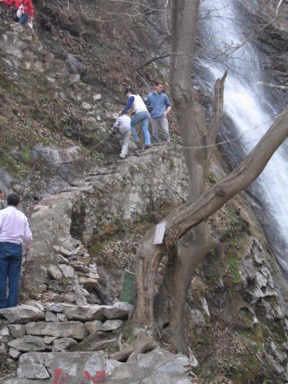
or one with no rail and

wet rock; the habit of the locals was to pass each other anyway.
Above left, a narrow path, at the Cape in RSA; Top right, Pete, inter alia, not far from Xi’an; below left, on Snowdon.
Places where we would have a conniption fit at the prospect of taking small children is of no consequence here. Indeed, all the fears found in Britain of making the great wild outdoors more accessible by addition of paths are demonstrated here. The path exists, so assumptions of safety are made; the idea of being sensibly equipped runs to carrying a water bottle (in your hand). A weatherproof is a foreign idea, as is sensible footwear; so wearing either is not going to happen. I went out in the snow and my colleague was wearing trainers, no hat or gloves, no pockets, no bag of gear at all. Yet in Britain we decry anyone stepping onto a hill without ‘proper’ gear. My attitudes are seen here as totally unnecessary, more than a little strange and are likely to be passed off as carrying weight to slow me down. I have seen walking sticks used, but sensible footwear is rare.
See Huangshan for some example pictures taken more than a year later in a different part of the country. This is walking of a different style and standard from any British experience
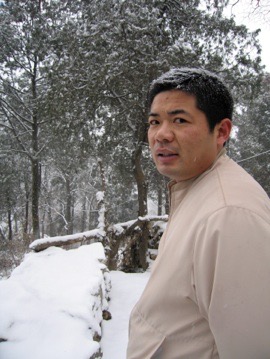
.
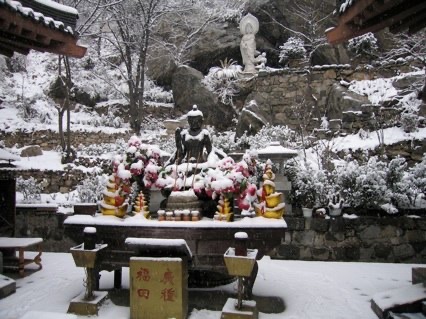
I wish to use the mountains for recreation, meaning walks of more than a part-day duration. The paths apparently go far enough but are likely to include buildings in unlikely places (monasteries, probably). So I am no nearer discovering the ‘form’ for camping, the likelihood of bears, poisonous snakes or insects, even the acceptable habits of long-distance walkers. Compasses and maps, obligatory in the UK, are considered irrelevant here (there is only one path, so why would you want one?).
Cleaning the school last week, a task done (badly) by the children, involves all sorts of activity forbidden in the UK, such as climbing on desks and chairs, besides unheard of activity such as becoming dirty, smelly or useful. Mind, there are no cleaning agents, just a damp cloth, a huge mop and a brush that looks like it came of a tree last week. Much higher standards are set at CCF Camp!! I watched an electrician reach a faulty switch by putting a school stool (about a foot cube in volume) on top of another. Judging by the observed response, this is entirely normal, as was children standing in windows (on the cill, and outside and, Oxford comma, several floors up). Yet these are the same people who have a fit when I suggest I might go wander off the path on a hill.
Sanitary considerations are similar. Our school classrooms are, by British standards, filthy and rich with potential for disease. The sanitary standards reach - or don’t - to the toilets (washroom or restroom, here, though they are neither). Urinal walls, and the vitrified shower bases that pass for the other facility - all with doors that fail in their purpose - are also cleaned, by staff this time, but still with only mop and water. Result: an accretion of excretion, unsanitary sanitary-ware, a stench trench. In warm weather the whole corridor, despite being open to the elements, is odiferous such that even the anosmic (me) can detect a problem.
China has been affected by disease; the reaction to the bird-flu outbreak in 2006 was to close schools (that is virtually unheard of) for a month; I comment elsewhere about famine, but there was a smallpox outbreak in the Fifties that killed 35,000. The country has never been decimated by plague, but the Japanese left behind some nasties in the local rat population when leaving Nanjing at the end of the last war, which killed a similar number. The people take cleanliness seriously, but only by washing, and rarely with soap. Deodorant is foreign; chlorine and bleach are available but not in use in public buildings. To European or American eyes this is unsafe, but to a Chinese it is normal – and therefore acceptable. As one child said to me about education, “Just because we have had an education system for 3000 years doesn’t mean it shouldn’t change”. [A year later the 3000 has become 4000.] The same applies to standards of cleanliness. Mind, some of the reluctance to use chemicals is environmental, for China is very much more conscious of poisoning the planet than any typical westerner appreciates; if everyone used chlorine bleach the damage would be colossal, although things might be cleaner. One wonders where the balance point lies.
Cultures are different. Understanding requires communication and discussion but not demands of one party by another; understanding requires sufficient listening for comprehension to occur and for misconceptions to be banished. It is difficult to be receptive when agitated; diplomacy may be the lair of practised liars, but control of emotion is necessary for successful communication in moments of cultural stress. It continues to amaze me just what offends one’s cultural standards and how small an issue can set off one’s temper.
DJS 200801
Pictures added 2010
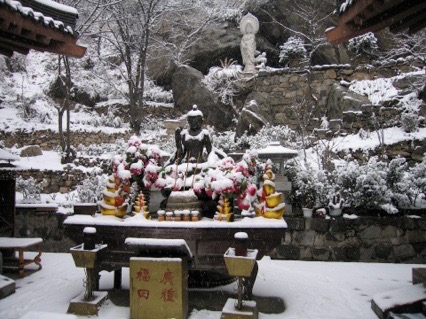
Week 0: arrival
AAARGH!!
OK, so I spent what felt like two days on a plane. Sold the car on Monday morning, exacerbated by taking an hour to drive the 400m back to the M25. The problem was restrictions in the other direction, but the effect went back at every junction, no matter which way one wanted to go. The rest of Monday was spent already in transit, very slowly getting to Heathrow (1400), then finding the right terminal (not shown on the ticket, T2 as I had guessed), then finding where to check in—also not obvious. The flight left at 2120 so boarding was 2020. So I filled the time with some eating, some sudoku, more eating and found a hot spot so I could log on and check up on mail. No new mail.
Flight broken in Shanghai, PuDong. This time I remembered to do transit checking to discover the gate for the next flight; this time I went and waited for luggage to arrive to be sure mine did not appear; yet again I got lost in the arrivals area, but I knew to go into the transit area, and then up to the third (“second”, in UK) floor to find the gates. Except gate 5 is not obvious when the signs show only letters. So I wandered up and down (this, I remember now, I have done before). Gate 5, amazingly is the gate furthest away, even further than Gate 1. You have to go past all the lettered kiosks (between, perpendicular to their line) to find the way to the gates, but nothing says so, in any language. I time arriving at the gate to fit with the boarding time of 1620 for a 1720 flight but the plane is delayed, and the assembled crowd is deferred and at 1720 we are offered ‘the’ flight meal. With chopsticks, so the majority of the Europeans are caught out with food not yet eaten when we are called to board at 1750. [PS: that does not include me, already up to speed.] We are about 40 mins late, eventually. Arrive Xi’an and I am whisked away as an International arrival, with a small lady with child to whom, to my amusement, it is assumed I am related. Incoming checking was trivial, partly because the papers to be collected were taken at Shanghai; I go through the green channel—no queue for me—and so I am first onto the concourse. But there is no Xiaolan to greet me, and when all are gone I parade slowly up and down the whole concourse to eventually and to great relief find her at another gate. Hence into Xi’an and, since it is quite late, no more meals (for another was served on the plane) and she drops me at school to a ‘standard school room’, a pretty reasonable standard of accommodation, bigger and more amenable than the rooms last week in Cambridge. (see Ineffective Invective) This ends Tuesday, having lost eight hours in the flight.
Wednesday begins with no breakfast because the first appointment is for the medical exam required to presage any residential permit. I need the residence permit before I can be permitted to bring my belongings into the country. Xiaolan drags me from pillar to post within a building whose only purpose is this testing, cutting through queues with scant regard to procedure or etiquette. The order of the rooms is not the order of the visits, of which there are maybe half a dozen: we need to redo my photographs, a blood sample is taken, a chest X-ray for the lungs and ultrasound for the middle abdomen (lungs to waist). Shirt on and off, but no more. The examination itself is done (exclusive, this) with ‘the officer’, who asks me height and weight, and about my sight correction (in English) – and that is it. All this takes until 1045 and next we do the Police Station, where a temporary residence permit is issued. I point out that this could more reliably be done at the airport, but that, it seems, would not cover the nationals. Of course, I would not recognise a need for that. By now I have learned my passport number and I am much amused that the tiny village of Stannington, where my birth was registered, is repeatedly accorded status where ‘England’ is probably what they want to record as place of birth. But this demonstrates the bureaucratic mind; never mind the point of the question, I want the information because the form demands it. “Where were you born?” is not the intended question, which would be “what is the place listed in the passport as place of birth?”. But the bureaucracy insists on asking the first question while wanting the second answer. In the same way the bank (later) wanted to know what is my salary and its periodicity (monthly). No, no, no: What they want to know is does that salary number represent a monthly figure or an annual figure… but the word salary means the sum you get paid each year without counting hours. So confusion is perpetrated and no doubt the word salary ends up losing meaning. Here, in effect it means monthly stipend, however calculated.
Then to lunch: clearly Xiaolan expects me to consume beer at every opportunity and is surprised when I point out that, having had no fluid since 2200 yesterday, this would not be sensible. She too has Yang Fei’s problem of ordering too much food, but we eat well and take an hour ‘off’ in school, where I repack and tidy my accounts. At 1330 we walk to the new flat for a 1400 meeting. Nice enough rooms, with two to greet (Vincent and Liu are the outgoing couple) and soon after that two ‘agents’ arrive, followed briefly by someone to read meters. Too many people and not enough answers. It transpires (a recognised feature of life, transpiration) that a year’s rent is expected, up front. I don’t have even one month’s rent on me, since I am supposed to be paying only the excess over the allowance. Ah, but what actually is to happen is that I rent as one arrangement and Dipont (wrong, it turns out, the school) pays an allowance to me (not to my landlord), monthly—as a separate arrangement. So I am to find 13x2400 RMB, and pay it to Vincent, before even my first paycheck – which happens to be Sept 11. Vincent is sharp enough in Chinese and in English to recognise that the date is not auspicious. I sign contracts: I am not going to do otherwise. There is enough space (both to sign a signature on the form and in the flat for living) and allegedly internet broadband, gas, electricity, hot water and air conditioning. It is as I described my wishes to be. Everything is explained only by doing it, never as answers to questions here, so proper planning is rendered impossible.
Next we went to the HSBC bank in Xi’an, not far at all from the Dipont office. More shenanigans. Opening an account is not a trivial matter. Money is enthusiastically welcomed from abroad, but taking it out is not permitted, or maybe once a year if you ask nicely. I shall be moving far too much money to China and it looks already (writing this a day later) as though I will be left waiting for the day when it is permitted to move it back. Dipont [wrong again; the host school] only pays into the Bank of China, so I must have an account there, too. I opened an account at HSBC and must move an excess of £7000 [wrong, too: £50,000] into that account within the next month. Since I don’t yet know how restricted my internet banking will be, I do not know if this is a wise move or not, but not doing it seems more silly. One may yet find out. I am distinctly suspicious of motive and intent at the bank, but at least I could give them a mauling in English if necessary. So I finish here with an account number, but no money moved—why not is unclear, except that I wouldn’t be surprised to discover this apparent failure is the hint that I should not be doing this.
A brief visit to the office follows, where Xiaolan picked up mail, allowing us to collect my air-freighted bags and, by presuming upon one of the staff with a car, we take those two cases to the new flat, return to school for the other two, drop them off at the flat too and take ourselves (helper included) to dinner. Which, since he invited his new (and gorgeous) girlfriend to join in, is a neat move on his part and a decent return on his help.
So by 2100 I am in the new flat and can unpack. It is now I realise that the smell I had thought to be exiting children is strongest in the bedroom and reminds me of mice. Air con on high and struggling to cope with the heat. It might be the water, which is piped hot from underground.
Thursday, and the first order of the day is more money, so as to be able to pay two months rent in cash. The second ATM I find will work in English and will let me extract the maximum of 2000 RMB on my credit card. This, I discover later, is about £135 and has an attached cost through Visa of 2%. I really need to be able to check balances too and will explore to see if that is an option next time I try this, unless I can persuade the internet connection to work. Shopping for cleaning kit and a pillow comes to £4. Add on some cereal, sandwich material and an evening meal and the whole is…. How do measure the size of the bed to know what sheets I need? Answer; I know the size of A4 and I have some….
I keep feeling very tired – is this jet lag, or is it an avoidance reaction? I must ring Vincent and ask about internet connection. My system says it has ISP but not internet. That means I need an ISP address, I think. He gave me a username and password, but there is something before that to insert.
Slept for nearly three hours and rang Vincent. Discovered that there is a phone in every room (but since the norm is to use your mobile here, why?). He worked hard at finding the solution to the problem (ADSL should not need very much in the way of information to work; neither router present could establish any DSL connection). An hour later – an hour more, because I had spent quite a lot of time on the problem before ringing him on the grounds that some information was missing – a connection is established, because the weak link is the telephone connection. Yippee !!
Vincent is keen for me to integrate (not the maths sort; I can do that) and has several suggestions, among which is a guided tour on the weekend. I’m up for this.
Friday, day three, lost a large part of the morning catching up on email. Eventually I ventured out to try to buy a local mobile. Almost got myself lost and had to backtrack until I found an area I recognised. Shopping here involves far (far) too many staff and you cannot just browse; if you pause, then some assistant comes to assist. Sadly for them, I want leaving well alone. I still hate shopping – it is a necessary task, not a joy. I found several phone shops eventually, on the top floor of any department store (which look like office buildings, so I must be missing the clues). The assistants all stand far too close, almost touching and definitely inside my zone of comfort. At that proximity I cannot even begin to think of things to say in Mandarin because the discomfort disables the ability to think flexibly enough to even attempt a conversation. Xiaolan’s office companion said his phone cost 200 RMB and I should find lots at 400. The cheapest I found was over 500 and most were around 2000. So no, thank you, I’ll wait for an iPhone that I want, not have a phone that I don’t want. The locals won’t like that.
I ended up buying an ironing board and a bed-sheet from the supermarket where I have succeeded in all sales so far. No, I know they are not for phoning people. I was allowed the space to look at the ironing board, so was able to choose sensibly, but the bed-sheet was a different matter. On the principle I was likely to get this wrong I aimed to equip the smaller of my two beds, which is a metre wide. There is a helpful chart over the aisle and by the time I have stopped to study it I have four female heads in my armpits. Discomfort zone! I pick up one woman easily by the elbows and put her at a comfortable distance (oops); I point and gesture and am presented with something more than twice too big, then a bed spread, then a duvet, then something close and a demonstration with a nearby bed as to why the sheet I am holding is not the size I was pointing at. Best, this (older, the one I womanhandled) assistant proves to have been right. But what I really wanted was a little choice, some time to ponder and time to ask the questions I didn’t expect to have to ask. I had no such opportunity, because this sort of helping doesn’t help. I cannot cope (yet or ever is an unknown) with this level of interference. I now know how Father feels about shopping, but he has this level of agitation in his native English….
The department stores I walked around were practically empty of customers – but then the first floor was all make-up and jewellery, the second floor was all clothes, mostly female, and the top floor seemed to at least include blokes.
Apparently the vision of a bloke carrying an ironing board is fundamentally funny here. One guy almost fell off his bike for staring. I get the pressed shirt but not the joke.
Yesterday I found the food part of the supermarket. Upstairs, of all unlikely things. It would seem that the thinking is that by making one walk through the other goods to approach the till, one raises the chance of further sale. The heat is so great that I (for one) couldn’t stand the idea of mixing food-buying with other goods unless I do the other goods first. But the food buyers pick up a hand basket while the other goods buyers use a trolley. Partly this points to the difficulties of moving a trolley around upstairs (the ramp up is no problem), partly to the staffing levels – there’re just too many people in the way. I have joined a facebook group called something like “I walk faster than you, GET THE HELL OUT OF THE WAY” which serves to let off steam in agreeable company. Walking here is a leisurely stroll: this may be to try to keep just below the sweating threshold.
The heat is worth discussion. This is summer, and the lowest temperature I have experienced is 26ºC in the hours before dawn. The humidity and the dust levels from local construction are both high. Air conditioning is on all over town, which lowers the temperature inside and makes outside warmer still. I think the day-time high is pushing 40ºC. I have, at the time of writing these last few paragraphs, just been for dinner down the street. I guessed from the photos in the menu what might be edible. Having experienced too much food and many dishes I didn’t order, I only ordered two dishes tonight. One proved to be meat and a spicy sauce over a flame, with the tiniest bowl to bounce it in with chopsticks. Fine, except the meat has been butchered in the Gurkha style and is full of bones, so I end up putting a vast amount of bone around the rice cake that is what dish two turns out to be. I saw a photo of a biscuit as one might have with coffee; my idea of scale was off by 50% and I have a medium sized cake to eat on my own. By the time I have eaten most of both dishes I am bloatedly full, grateful for the accompanying green tea but unable to eat any more without embarrassment on the way home. I look up the phrase for where to pay and find that the whole meal is 45 RMB, very close to £3. The only detractions were that the building was not cooled and I have melted into my shirt and I have consumed my handkerchief too. I needed serviettes, lower temperature, company to share the food (with an additional plate of vegetables) and maybe a beer. Which would have raised the total to £5, perhaps. So food is cheap. However, the way the locals are eating, it will not be long before they lose their gorgeous slimness and turn into overlarge Asian Americans. Let us hope they can find a balance soon.
DJS 20070803
Visiting Britain
Visiting Britain when you live abroad is an odder experience than you might imagine. Yes, you’re going home, but then you probably think you had some pretty good reasons for leaving. My trips back in the summers of 2008 and 2009 left me with the same feeling each time – what a wonderful country. With most countries around the world I have had the same reaction, followed by the caveat, “pity about the people that live there”. Britons try very hard to fit that same sad label.
August 2008’s trip was remembered for the complaining, primarily. I would arrive somewhere to fill the tank or the stomach or a bed – in general, to spend money – and what I heard from the customers, and all too often from the staff, was an endless ritual of complaining. The weather, the state of the nation, the nation state, the neighbours, the football, the family; you name it, it got the treatment. My working definition of a good hotel (café, etc) was where the staff didn’t, where they presented a cheerful face to the world, where they allowed your (my) own enjoyment of the country free rein and in turn made their job more enjoyable. Recursion does not necessarily involve more swearing...
August 2008 was also while the Olympics were being held in Beijing. The excitement in China was tangible. There were screens everywhere, including on the local buses in Nanjing. Huge screens that were usually used for advertising would be set on one of the national channels covering the action. Talk was about the Olympics: not about the sport, but about what it meant for China. Much of what was said was absolute crap, but I (now) suspect that applies to any nation as we steadily lose any ability to think for ourselves. The belief in China was (and largely still is) that having the Olympics would change (and has changed) the world’s view of the nation and therefore (they think) bring increased prosperity. It has proved true that the nation feels good about itself in a way that it did not, say, three years beforehand. The high point of the whole affair was the Opening Ceremony (and please see my comments on Sports Days); this is consistent with ‘face’ issues here (see Issues of Face). Only first place will do in China; second is nowhere, compromise is nothing. This is totally at odds with everyone’s individual life. The same odd thinking is what causes all but the most experienced to compete flat out until they cannot continue, with no regard to past experience, to intelligent thought; some sort of cultural imperative takes over. So a typical 1000m race (on a 400m track, so 2.5 laps) will have at least one (idiot) running to the line from the off as if the whole race is 200m long. On reaching the line he/she will act as if this is the finish, performing for the camera(s). One metre after the line reality hits and they (note the singular ‘they’) slow down as if hit. On the next lap, someone else will behave the same way. In between whiles, but most often near the start, anyone who can do so will strive for a moment in / at the front. It would appear (no one will talk to me about it, I must be stamping on all sorts of conventions) that being first at any point in the race is sufficient to gain kudos, credit, face, whatever. This is then consistent with the actions of those who realise they cannot come first (often discovered on the last lap) – the spectacular collapse, often just before the line. It’s all about “me, me, me” and I find it very difficult to get this to fit with the other activities of Chinese in general. There is a dichotomy between extreme selfishness at an individual level and immense co-operation when many are in the same situation. Read my comments on driving (see Traffic) with that in mind; I now see that most of the time the selfishness continues, but the effect (of not losing tempers) looks like wonderful comradeship. The modern face of communism, perhaps?
So…
Typically, a commentary that is on the face of things about Britain is just as much about China. And so it should be, for you read this to put my observations of China into context. If my comments on Britain ring no bells, then either we see (and maybe live in) different worlds, or at least one of us is some sort of idiot. I know I’m mad; I live in China.
In August 2009 I was back in Britain. The trip for the month worked out at about £200 per day, as it did again in February ’10 - i.e. expensive. What I heard this time in ’09 was a similar level of complaint to the previous trip. What I experienced was a gorgeous summer: there was sunshine everyday – I was very sensitive to this, having had white skies throughout the stay in Xi’an and blue skies but rarely in Nanjing. There was occasional rain, but only briefly. I had a wet day in the hills (thanks again, Pete) that was all the more exciting for that, but the day before was idyllic and if the subsequent week was a bit grey, I still saw some blue every day all month. Yet what I heard was moan, moan, moan.
Yes, Britain is an expensive place to live. On the other hand, you have some wonderful facilities you take for granted, you have access to all sorts of things not available elsewhere and if everything goes wrong for you the State will pick up the pieces. Examples: I couldn’t get used to shops being shut. In China, if I’m awake, there are shops open. If it is Sunday I cannot tell the difference (yes I can; there is slightly less construction noise). In Britain you have free medical services; in China triage takes place first, then you pay, then you get treatment: no pay, no treatment. Life is cheap, here.
Britain has leisure. France has even more. China doesn’t recognise it. You either play (sport, music, whatever) at a professional level or you don’t do that (well, you don’t admit to it), you do something different, usually called a job. Not-working is anathema, it is wrong, it is suspect. Conversely, of course, the level at which most work is done is very low and all sorts of activities become ‘work’, including eating and drinking. Education is perceived as the cure for everything, it opens all doors – but then (here) the proof that you have an education lies in the paper and not in the performance; the exception is to do with who you know and what you can buy – there are many incompetents in powerful jobs who bought (not fought, bought) their way to that position, not unlike Britain in the eighteenth century (I’m thinking of Wellington’s era). Britain has television, sport, clubs, societies; its people have pastimes and hobbies. If you don’t (if you choose not to), that is your choice and I feel a little sorry for you (which is stupid, why should I? I’m in the same position here from a different set of choices). Here there is no such choice. A few (as a %) take exercise – that takes many forms, from tai chi, performed anywhere (really) and at any time (really), through ballroom dancing (I’ve seen this at 08:00 outside on a Sunday), aerobic dancing (imagine a thousand people in a grid pattern, with a speaker system blaring in the remote distance, sometimes with a solitary figure on a podium or stage up to 150m away). Energetic, sweaty, exercise is rare. We (go on, wonder) have a track nearby and the majority walk around it (many go backwards, see Looking Both Ways); those that do run are not going to wash afterwards. So people like me (that’s a count we can do on one hand) with British values of ‘exercise’ are so rare that I can sell the space on my chest for advertising.
Go on. Laugh.
DJS 20100513
there’s more to write, but this is a publish-and-be-damned moment... I’ll get back to it eventually.
Related essays: Issues of Face. Looking Both Ways, Sports Day.